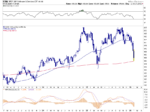Tag Archive: newsletter
Im Bärenmarkt investieren #shorts
?Hol dir 100 CHF Trading Credits bei einer Aktien-Depoteröffnung ►► http://sparkojote.ch/swissquote *
(only for swiss residents)
Ganzes Video:
▬▬▬▬▬▬▬▬▬▬▬▬▬▬▬▬▬▬▬▬▬
☛ Die BESTEN Gutscheine aus dem Finanzrudel ☚
Tools die ich tagtäglich nutze findet ihr hier. Mein 6-stelliges Aktien-Depot habe ich bei Swissquote und Yuh. Für meine privaten Finanzen nutze ich Zak von der Bank Cler. Meine Säule 3a für die Altersvorsorge betreibe ich bei frankly...
Read More »
Read More »
Who Really Owns Big Digital Tech?
By now it should be perfectly clear that the most prominent Big Digital companies are not strictly private, for-profit companies. As I argued in Google Archipelago, they are also state apparatuses, or governmentalities, undertaking state functions, including censorship, propaganda, and surveillance.
Read More »
Read More »
Sam Bankman-Fried Interview mit New York Times (REAKTION)
Sam Bankman-Fried hat ein Interview gehabt mit der New York Times. Meine Reaktion dazu findest du in diesem kurzen Video. Ist er wirklich das Opfer?
Sam Bankman-Fried Interviewed Live About the Collapse of FTX:
————
#JulianHosp #Bitcoin #Blockchain
————
Hat dir das Video gefallen? Gib mir nen DAUMEN HOCH ? bzw. TEILE dieses Video um gemeinsam AT, DE und CH #cryptofit zu machen!
? Kein Video mehr verpassen? ABONNIERE meinen Kanal:...
Read More »
Read More »
Max Otte: Grundvertrauen geht verloren
▶︎ EINLADUNG ▶︎ „Die größten Gefahren für Ihr Vermögen“ - Online-Info-Veranstaltung
✅ Hier gratis anmelden: http://bit.ly/3tYQykY
MAX OTTE ONLINE
▶︎ Privatinvestor TV: https://www.youtube.com/c/PrivatinvestorTV
▶︎ Max Ottes Webseite: https://max-otte.de/
▶︎ Max Ottes Buch: "Weltsystemcrash: Krisen, Unruhen und die Geburt einer neuen Weltordnung"
Hier bestellen: https://bit.ly/Max-Otte-auf-Amazon
▶︎ Max Ottes neues Buch: “Auf der Suche...
Read More »
Read More »
A.P. Moller – Maersk and IBM to Discontinue Blockchain Trade Platform Tradelens
A.P. Moller – Maersk and IBM announced the decision to withdraw the TradeLens offerings and discontinue the platform.
Starting immediately, the TradeLens team is taking action to withdraw the offerings and discontinue the platform, and the intent is that the platform will go offline by end of quarter one, 2023. During this process all parties involved will ensure that customers are attended to without disruptions to their businesses.
Maersk will...
Read More »
Read More »
This Is of Course Insane
Greed is a powerful motivation to be an ardent believer in the central banking cult. The ideal cult convinces its followers that it isn't a cult, it's simply the natural order of things.In current terms, this normalizes insane behaviors and beliefs. Sacrificing youth to appease the gods isn't a cult; it's simply the natural order of things.
Read More »
Read More »
The 2nd Factor Impacting the World Order: Structural Divides
America’s political and income divide is the second factor impacting the world order. #principles #raydalio
Read More »
Read More »
VIDEO: Soft landing? Happy days are here a again. A look at the markets post Fed Powell speech.
"Soft landing" may be still a hope, but the market likes those words.
The Chair Powell speech/comments were laced with "slower pace", and "soft landing" which was comforting to the markets. So stocks moved higher and that gave dollar sellers the go-ahead to sell the green back, the lower USD, gave the bond traders the go-ahead to buy bonds and send yields lower, and all of that fed on itself.
Happy days are here...
Read More »
Read More »
ELON MUSKS TWITTER…
Klicke hier, um Dich gemeinsam mit Oli unabhängig zu machen:
? http://bit.ly/oli-ausbildung
Meine Webseite: https://tradingcoacholi.com/
►Mein Telegram Kanal: http://t.me/tradingcoacholi
►Folge Oliver auf Facebook: http://bit.ly/TOFBpage
►Folge Oliver auf Instagram: http://bit.ly/TOInst
►Oli macht auch TikToks: https://www.tiktok.com/@tradingcoacholi
►Abonniere Oliver auf YouTube: http://bit.ly/Oli-Kanal
DIE TRADING COMMUNITY VON OLIVER KLEMM...
Read More »
Read More »
Deflation – Kommt alles ganz anders?
► Sichere Dir meinen Report, mit Tipps zu Gold, Aktien, ETFs und erhalte weitere Informationen, zu meinem neuen Projekt - 100% gratis: http://lars-erichsen.de/
Goldman Sachs kommt in einer aktuellen Studie zu dem Ergebnis, dass die meisten Privatanleger für die kommende Börsenphase völlig falsch positioniert sind. Ob das möglicherweise auch dich betrifft, möchte ich in diesem Video klären. Bitte schaue es dir an, es ist wirklich wichtig!
► NEU:...
Read More »
Read More »
Nachhaltige ETF finden: So geht’s! Ethische Geldanlage mit nachhaltigen ETFs
Nachhaltige ETFs finden und vergleichen!
Zur ETF Suche: ►► https://www.finanzfluss.de/informer/etf/suche/ ?
Kostenloses Depot eröffnen: ►► https://link.finanzfluss.de/go/depot?utm_source=youtube&utm_medium=549&utm_campaign=comdirect-depot&utm_term=kostenlos-25&utm_content=yt-desc *?
In 4 Wochen zum souveränen Investor: ►►...
Read More »
Read More »
The Statist Victory on Trump’s Tax Returns
The mainstream media is celebrating big time over a recent ruling by the Supreme Court that forces the Treasury Department to deliver President Trump’s income-tax returns to Congress. A good example is the Washington Post, which published an editorial last week praising the ruling.
Read More »
Read More »
Gold To Hit New Heights “People Are Not Going To Believe” – Alasdair Macleod |Gold Price Prediction
Gold To Hit New Heights "People Are Not Going To Believe" - Alasdair Macleod |Gold Price Prediction
⬇ Inspired By: ⬇
#goldprice #goldpriceprediction #alasdairmacleod
--------
? Checkout These Similar Videos?:
-------
? Don't Forget To Subscribe For More: shorturl.at/twPQ2
Read More »
Read More »
The FED could crush the market? | FED rate hike – Alasdair Macleod
The FED coul crush the market? | FED rate hike - Alasair Macleo
Welcome to Vertex Finance, In this channel, we create financial eucational content, an we help you get smarter an financially eucate. Our goal is to provie short engaging vieo content relate to finance, that will motivate you at the same time.
LIKE, SHARE, SUPPORT & SUBSCRIBE
Creit goes to the speaker: Alasair Macleo
Thank you
RELATED QUERIES:
interest interest rate hike...
Read More »
Read More »
The morning forex technical report for November 30, 2022. Markets prepare for Fed Powell.
The major currency pairs are settling and waiting for the Fed Chair.
The major currency pairs are seeing some mixed price action, but with the pairs like the EURUSD, GBPUSD and USDJPY trading between their 100 and 200 hour MAs. That is indicative of a market that is awaiting the next shove. That shove may come from the Fed Powell's speech later today at 1:30 PM. Will the Fed chair tilt to a more dovish bias or keep his relative hawkish bias from...
Read More »
Read More »
Bankenkrise 2.0 – Rette sich wer kann
Im heutigen Video erkläre ich dir, wieso die Bankenkrise von 2008 nie vorbei war und jetzt wieder neu entfacht wird.
kostenloses Online-Training: Wie du von der Bankkrise profitierst???:
► https://go.investorenausbildung.de/3VJqDu4
Der Deutsche Derivate Verband:
https://www.derivateverband.de/DEU/Transparenz/Credit-Default-Swaps
vereinbare jetzt dein kostenloses Beratungsgespräch??:
► https://go.investorenausbildung.de/3CMgVOY...
Read More »
Read More »
All Eyes on Powell | 3:00 on Markets & Money
(11/30/22) A bevy of Economic reports could move markets today, but the biggest factor may well be what Fed Chairman Jerome Powell has to say this afternoon. Personal Spending and the second estimate of Q3 GDP are released this morning. Powell's speech is the last public commentary before the Fed moves into a two-week blackout period ahead of their December 14 FOMC meeting, at which the next interest rate announcement will be made. Questions hoped...
Read More »
Read More »
All I Want for Christmas is a Gift of Stocks
(11/30/22) The US beats Iran in World Soccer, and markets gird up for the last Fed speech of the year by Jerome Powell; that will be the big market mover today, in addition to economic releases of Q3 CPI and Home Sales; We looks at the concept of stock gifting for Christmas, along with the tax implications, qualified charitable donations, and end of year IRA contributions; other end-of-year hurdles include Required Minimum Distributions, and the...
Read More »
Read More »
Why Real Freedom is Financial Independence – Robert Kiyosaki, Patrick Bet-David
Robert Kiyosaki and his special guest, Patrick Bet-David, are going to reveal the number one skill that can change your life. Don’t miss this motivating and revealing discussion that is designed to help you…be a better investor…be a better entrepreneur…and develop new approaches and mindsets that will help launch you to achieve REAL FREEDOM.
After viewing this event, take advantage of a special offer for YouTube viewers to help you get started as...
Read More »
Read More »
Who Pays Wealth Tax: The Rich or the Poor?
The Spanish government’s announcement that it plans to introduce a new “solidarity tax” on the wealth of those who possess over €3 million has again brought to the fore the debate about taxes levied on wealth and capital. The issue is not merely that the announcement is highly politicized in what is already, de facto, a preelection period, nor that it could disrupt the fiscal autonomy of Madrid, Andalusia, and Galicia.
Read More »
Read More »
























































